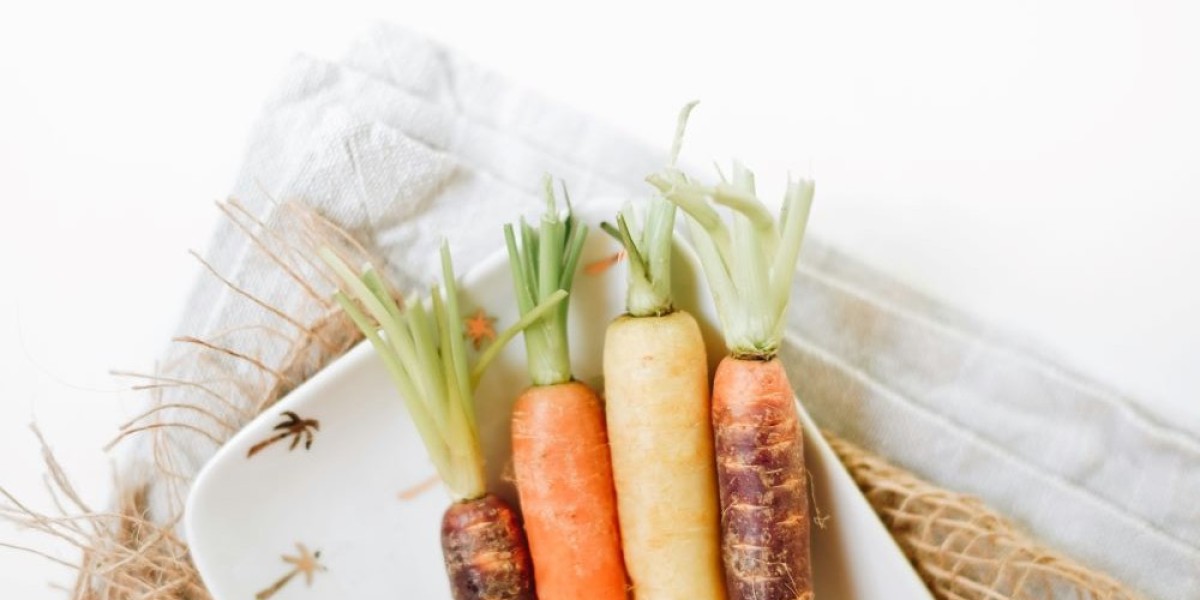Greenhouse farming allows growers to control environmental conditions, allowing carrot cultivation year-round. In a greenhouse, factors like temperature, humidity, and light are carefully regulated, creating ideal conditions for producing high-quality carrots with fewer issues related to pests and weather fluctuations. However, not all carrot varieties suit this type of controlled environment. Choosing the right variety is crucial for optimal growth, flavor, and yield.
Why Greenhouse Farming is Ideal for Carrots
Greenhouse farming offers numerous benefits for carrot cultivation, from extending growing seasons to minimizing exposure to pests. Carrots grown in greenhouses typically have better uniformity, taste, and texture because the environment can be tailored to their needs.
Advantages of Greenhouse Farming for Carrots
Year-Round Growing: With controlled conditions, greenhouse farming allows for the continuous production of carrots, regardless of external weather conditions.
Pest Control: Greenhouses minimize exposure to common carrot pests such as carrot rust flies and aphids, significantly reducing the need for pesticides.
Optimal Environment: Growers can optimize conditions for carrot growth by adjusting temperature, humidity, and light levels, ensuring high yields and premium quality.
If you want to start greenhouse farming, it’s essential to begin with the best seeds available. Explore options to purchase carrot seeds specifically bred for greenhouse environments, maximizing your potential for success.
1. Nantes
Characteristics: Nantes is one of the most popular carrot varieties for greenhouse farming due to its adaptability and sweet, crisp flavor. It produces medium-length carrots with a cylindrical shape and smooth skin, making it a great choice for fresh market sales.
Best Greenhouse Conditions: Nantes carrots thrive in temperatures between 15-22°C (59-72°F) with consistent moisture levels and well-drained, sandy loam soil. Ensuring steady light exposure while avoiding extreme temperature fluctuations in greenhouses helps maintain uniform growth.
Nantes is a reliable variety for those seeking high-quality carrots with consistent yields, making it a staple for greenhouse carrot growers.
2. Amsterdam Forcing 3
Characteristics: Specifically bred for greenhouse and protected cultivation, Amsterdam Forcing 3 is an early-maturing variety. It produces small, tender carrots with a bright orange color, perfect for gourmet markets. This variety matures quickly, with a harvest time of 60-65 days, allowing for multiple planting cycles each year.
Best Greenhouse Conditions: Amsterdam Forcing 3 prefers temperatures between 15-20°C (59-68°F) and moderate light levels. It requires a well-drained soil mix to prevent waterlogging and promote root health.
Amsterdam Forcing 3 is ideal for growers who want to maximize greenhouse space and achieve rapid harvests. Its fast growth cycle makes it a versatile option for staggered planting schedules.
3. Chantenay Red Core
Characteristics: Chantenay Red Core is a robust carrot variety that performs exceptionally well in greenhouse environments. This variety produces short, thick roots with a deep red-orange core and a sweet flavor. It is known for its high beta-carotene content, making it a nutritious choice for fresh consumption and processing.
Best Greenhouse Conditions: This variety grows best in well-aerated, sandy soil with temperatures between 18-22°C (64-72°F). Consistent watering is essential, but avoiding overwatering is important, as the roots can be prone to splitting if the soil is too saturated.
Chantenay Red Core is particularly suited for greenhouses with limited space. It allows for high-density planting and efficient space usage.
4. Kuroda
Characteristics: Kuroda is a heat-tolerant carrot variety, making it a strong candidate for greenhouses that may experience higher temperatures. This variety produces thick, short carrots with a smooth texture and sweet taste. Kuroda is also known for its storage capability, making it a practical option for fresh and processed markets.
Best Greenhouse Conditions: Kuroda thrives in temperatures between 18-25°C (64-77°F) and requires well-draining soil to prevent root rot. Consistent moisture levels and sufficient light are key for optimal growth.
Thanks to its heat tolerance and adaptability, Kuroda is a versatile choice for greenhouse growers, particularly in regions with warmer climates.
5. Imperator 58
Characteristics: Imperator 58 is a classic variety prized for its long, slender shape and crisp texture. It is highly marketable, making it a favorite for commercial growers. This variety grows to 8-10 inches long and offers a deep orange color that appeals to consumers.
Best Greenhouse Conditions: Imperator 58 requires deep, loose soil and a greenhouse temperature range of 16-24°C (61-75°F). This variety also benefits from drip irrigation, which ensures consistent moisture while minimizing the risk of waterlogging.
With its high market value and uniformity, Imperator 58 is a profitable option for greenhouse farmers targeting fresh produce markets.
6. Baby Carrots (Mini Carrot Varieties)
Characteristics: Baby carrot varieties are well-suited for greenhouse farming because of their compact size and short growth period. These varieties produce small, tender carrots ideal for snacking or gourmet markets. The short growth cycle allows for quick turnovers and multiple harvests throughout the year.
Best Greenhouse Conditions: Baby carrot varieties thrive in shallow trays or raised beds with a well-draining soil mix. Maintaining temperatures between 15-20°C (59-68°F) ensures optimal growth and texture, while consistent light exposure supports uniform development.
Mini carrot varieties are perfect for maximizing greenhouse efficiency, especially in smaller spaces where quick harvests and compact growth are advantageous.
“Carrots are more than just a root vegetable; they’re a testament to how innovation in farming techniques, like greenhouse cultivation, can transform agricultural productivity.”
7. Purple Haze
Characteristics: Purple Haze is a unique variety known for its deep purple exterior and orange interior. It is rich in antioxidants, appealing to health-conscious consumers and niche markets. This variety grows to about 7 inches long and has a sweet flavor, making it ideal for fresh salads and gourmet dishes.
Best Greenhouse Conditions: Purple Haze requires temperatures of 16-22°C (61-72°F) with consistent watering to maintain soil moisture. Sufficient light exposure is also essential to preserve the vibrant purple color and maximize growth.
For growers looking to diversify their greenhouse produce, Purple Haze offers a visually striking and nutritious option that can command higher market prices.
8. Touchon
Characteristics: Touchon is a French heirloom variety that adapts well to greenhouse conditions. It produces small to medium-sized carrots with a fine texture and sweet taste. This variety is known for its quick growth and is popular among organic farmers and gourmet markets.
Best Greenhouse Conditions: Touchon prefers well-drained, sandy soils and moderate temperatures between 15-22°C (59-72°F). Consistent watering and moderate light levels are essential to maintain its delicate flavor and texture.
Touchon is particularly suitable for organic greenhouse setups. Its flavor and quality align with the demand for heirlooms and sustainably grown produce.
9. Parisian Carrot (Round Carrot)
Characteristics: The Parisian carrot, or the round carrot, is perfect for greenhouses with limited space. This small, globe-shaped carrot matures quickly and offers a sweet, crunchy flavor, making it ideal for salads and fresh eating.
Best Greenhouse Conditions: Parisian carrots grow best in shallow, well-drained beds with temperatures between 15-20°C (59-68°F). Moderate light and consistent moisture are vital to achieving the desired size and texture.
The compact growth habit of Parisian carrots allows growers to maximize greenhouse space, especially when using vertical or layered planting techniques.
10. Bolero
Characteristics: Bolero is a hybrid carrot variety designed for high performance in greenhouse environments. It produces uniform, bright-orange carrots that are sweet and crisp. Bolero is also highly resistant to common diseases, making it a low-maintenance option for growers.
Best Greenhouse Conditions: Bolero thrives between 18-22°C (64-72°F) with well-drained, loamy soil. It benefits from consistent irrigation and moderate humidity, which help maintain the carrot's size and quality.
Bolero’s disease resistance and adaptability make it an ideal choice for organic greenhouse farmers aiming to minimize chemical inputs while achieving high yields.
Final Thoughts: Optimizing Your Greenhouse for Carrot Cultivation
Greenhouse farming offers an exciting opportunity to grow carrots year-round, but success depends heavily on choosing the right variety. By understanding each variety's unique needs and benefits, growers can maximize yields and produce high-quality carrots that meet market demands. Instead of seeing greenhouse cultivation as simply growing under glass, view it as a dynamic environment where the right seed choice and management practices can lead to exceptional results, season after season.







